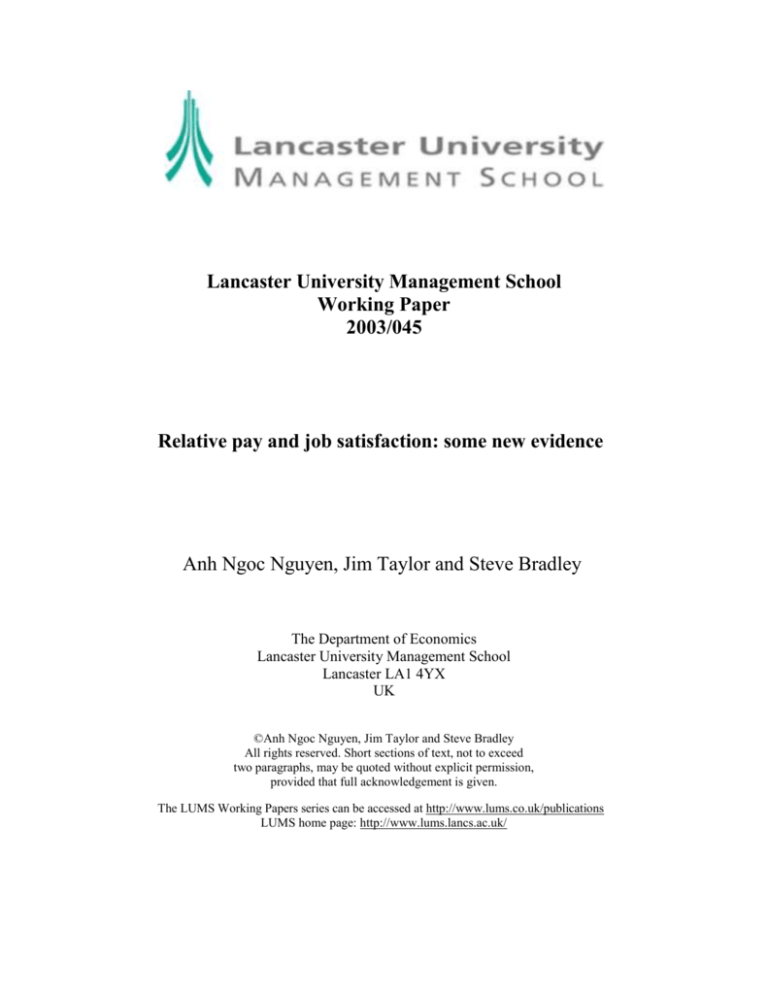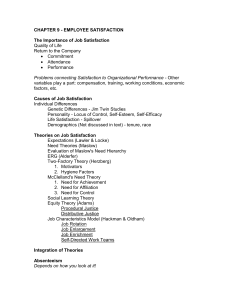
Lancaster University Management School
Working Paper
2003/045
Relative pay and job satisfaction: some new evidence
Anh Ngoc Nguyen, Jim Taylor and Steve Bradley
The Department of Economics
Lancaster University Management School
Lancaster LA1 4YX
UK
©Anh Ngoc Nguyen, Jim Taylor and Steve Bradley
All rights reserved. Short sections of text, not to exceed
two paragraphs, may be quoted without explicit permission,
provided that full acknowledgement is given.
The LUMS Working Papers series can be accessed at http://www.lums.co.uk/publications
LUMS home page: http://www.lums.lancs.ac.uk/
Relative pay and job satisfaction: some new evidence
Anh Ngoc Nguyen, Jim Taylor and Steve Bradley*
Department of Economics
Management School
Lancaster University
Lancaster, England
a.nguyen@lancaster.ac.uk
jim.taylor@lancaster.acuk
steve.bradley@lancaster.ac.uk
May 2003
* Anh Nguyen would like to thank the ESRC for financial support under its Post-doctoral
Fellowship Programme.
1
Abstract: This paper investigates the determinants of job satisfaction using data from the
National Educational Longitudinal Study. The determinants of interest include actual pay,
relative pay, hours of work, job autonomy and several personal characteristics. We also
investigate the determinants of satisfaction with pay conditional on a worker's satisfaction
with other domains of job satisfaction, such as satisfaction with job security. We find that
relative pay is statistically significant but that its effect on satisfaction with pay is relatively
small. Job autonomy has a powerful influence on satisfaction with pay. So too does being
black.
JOB
SATISFACTION
WAGES
AUTONOMY
JEL: J28
2
SECURITY
References
Allen J and van der Velden R, 2001, Educational mismatches versus skill mismatches:
Effects on wages, job satisfaction and on-the-job search, Oxford Economic Papers, 53, 434452.
Belfield C and Harris R, 2002, How well do theories of job matching explain variation in job
satisfaction across educational level? Evidence for UK graduates, Applied Economics, 34,
535-0548.
Blanchflower D., and Oswald A., 2000, The rising well-being of the young, in Youth
Employment and Joblessness in Advanced Countries, edited by Blanchflower D and Freeman
R, Chicago: The University of Chicago Press.
Blanchflower D., and Oswald A., 1999, Well-being, insecurity and the decline of American
job satisfaction, mimeo Darthmouth College USA.
Borjas G, (1979), Job satisfaction, wages and union, Human Resources, XIV, 21-40.
Booth A, Francesconi M and Frank J, 2002, Temporary jobs: Stepping stones or dead ends?
Economic Journal, 112, F189-F213.
Clark A. E., (1997), Job satisfaction and gender: Why are women so happy at work? Labour
Economics, 4, 341-372.
Clark A. E., 1999, Are wages habit-forming? Evidence from micro data, Journal of Economic
Behavior and Organization, 39, 179-200.
Clark A. E., 2001, What really matters in a job? Hedonic measurement using quit data,
Labour Economics, 8, 223-242.
Clark A. E., and Oswald A. J., 1994, Unhappiness and unemployment, Economic Journal,
104, May, 648-659.
Clark A. E., and Oswald A. J., 1996, Satisfaction and comparison income, Journal of Public
Economics, 61, 359-381.
Clark A, Oswald A, and Warr P, 1996, Is job satisfaction U-shaped in age? Journal of
Occupational and Organizational Psychology, 69, 57-81.
Clark A, Geogellis Y and Sanfey P, (1997), Job satisfaction, wage changes and quits:
Evidence from Germany, mimeo, University of Orleans.
17
Easterlin R. A., 2001, Income and happiness: Towards a unified theory, Economic Journal,
111, July, 465-484.
Freeman, R. N., 1978, Job satisfaction as an economic variable, American Economic Review,
68, 2, 135-141.
Frey B and Stutzer A, 2002, What can economist learn from happiness research? Journal of
Economic Literature, forthcoming.
Galdeano A, 2001, Gender differences in job satisfaction and labour market participation: UK
evidence from propensity score, mimeo, EUI.
Groot W and van den Brink H, 1999, Job satisfaction and preference drift, Economic Letters,
63, 363-367.
Grund C. and Sliwka D., 2001, The impact of wage increases on job satisfaction – Empirical
evidence and theoretical implications, mimeo, University of Bonn.
Hamermesh D., 1977, Economic aspects of job satisfaction, in Essays in Labor Market
Analysis, edited by Ashenfelter O and Oates W, Toronto: John Wiley&Son.
Hamermesh D., 1999, Changing inequality in markets for work place amenities. Quarterly
Journal of Economics, CXIV, 1085-1123.
Hamermesh D., 2001, ‘The changing distribution of job satisfaction’, Human Resources, 36
(1), 1-30.
Kaiser L, 2002, Job satisfaction: A comparison of standard, non-standard, and selfemployment patterns across Europe with a special note to the gender/job satisfaction paradox,
mimeo, German Institute for Economic Research Berlin.
Levy-Garboua L and Montmarquette C (1997), Reported job satisfaction: What does it mean?
Cirano, Canada.
Levy-Garboua L, Montmarquette C and Simonnet V, (2001), Job satisfaction and quits:
Theory and evidence from the German socioeconomic panel, Cirano, Canada.
Lydon R and Chevalier A, (2002), Estimates of the effect of wages on job satisfaction, Centre
for Economic Performance, LSE.
McBride M., 2001, Relative-income effects on subjective well-being in the cross-section,
Journal of Economic Behavior and Organization, 45, 251-278.
18
Neumark D and Postlewaite A, 1995, Relative income concerns and the rise in married
women’s employment, mimeo, Journal of Public Economics, 70, 157-183.
Phelps C, 2001, A clue to the paradox of happiness, Journal of Economic Behavior &
Organization, 45, 293-300.
Shields M and Price S, 2002, Racial harassment, job satisfaction and intentions to quit:
Evidence from British Nursing profession, Economica, 69, 295-362.
Sloane P and Ward M, 2001, Cohort effects and job satisfaction of academics, Applied
Economics Letters, 8, 787-791.
Sousa-Poza A., and Sousa-Poza A., 2000, Well-being at work: a cross-national analysis of the
levels and determinants of job satisfaction, Journal of Socio-economics, 29, 517-538.
Stutzer A, 2002, The role of income aspirations in individual happiness, mimeo, School of
Law, University of California at Berkeley.
van Praag B.M.S, Frijter P., and Ferrer-Carbonell A., 2002, The anatomy of subjective wellbeing, Journal of Economic Behavior and Organization, forthcoming, 1-21.
Vanin P., 2001, Job satisfaction and comparison income in Germany, mimeo, Bonn Graduate
School of Economics.
Ward M and Sloane P, 1999, Job satisfaction within the Scottish academic profession,
Discussion No. 39, IZA.
Winkelmann L and Winkelmann R, 1998, Why are the unemployed so unhappy? Evidence
from panel data, Economica, 65, 1-15.







